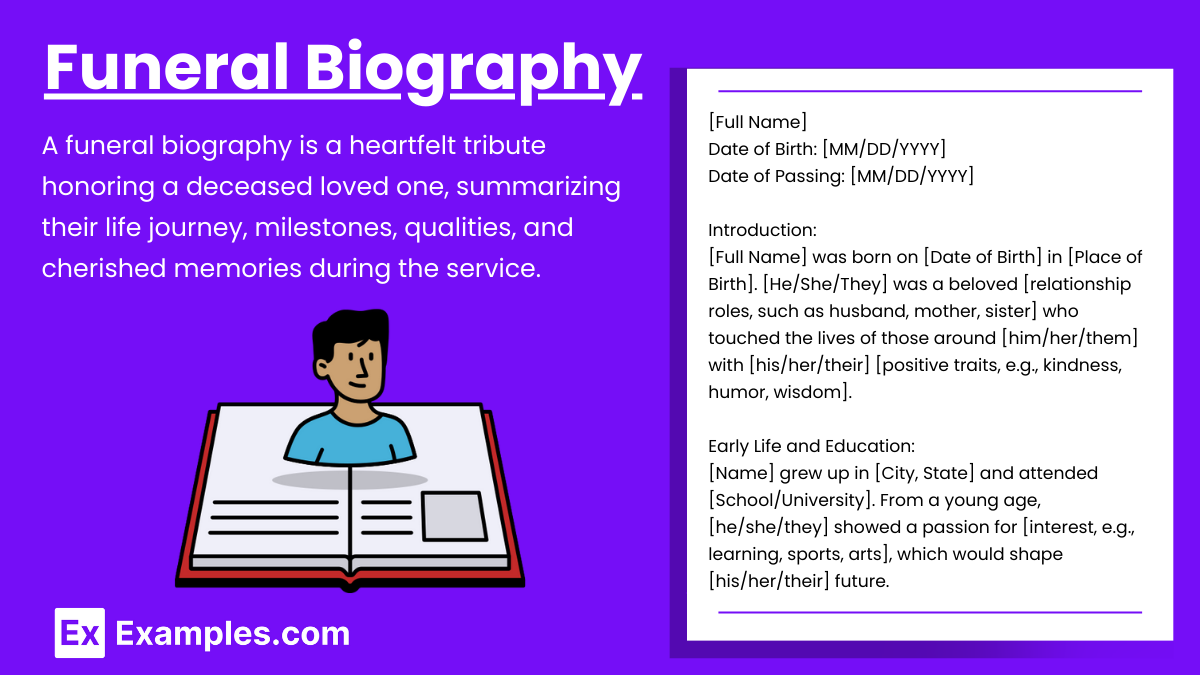5+ Funeral Biography Examples to Download
A funeral biography is a heartfelt tribute that honors and celebrates the life of a deceased loved one. Typically shared during a funeral or memorial service, it provides a brief overview of their life journey, including key milestones, personal qualities, and cherished memories. A well-crafted funeral biography helps family and friends remember and reflect on the deceased’s legacy, offering comfort and connection. It serves as a reminder of the individual’s impact on others, preserving their memory for future generations.
What is a Funeral Biography?
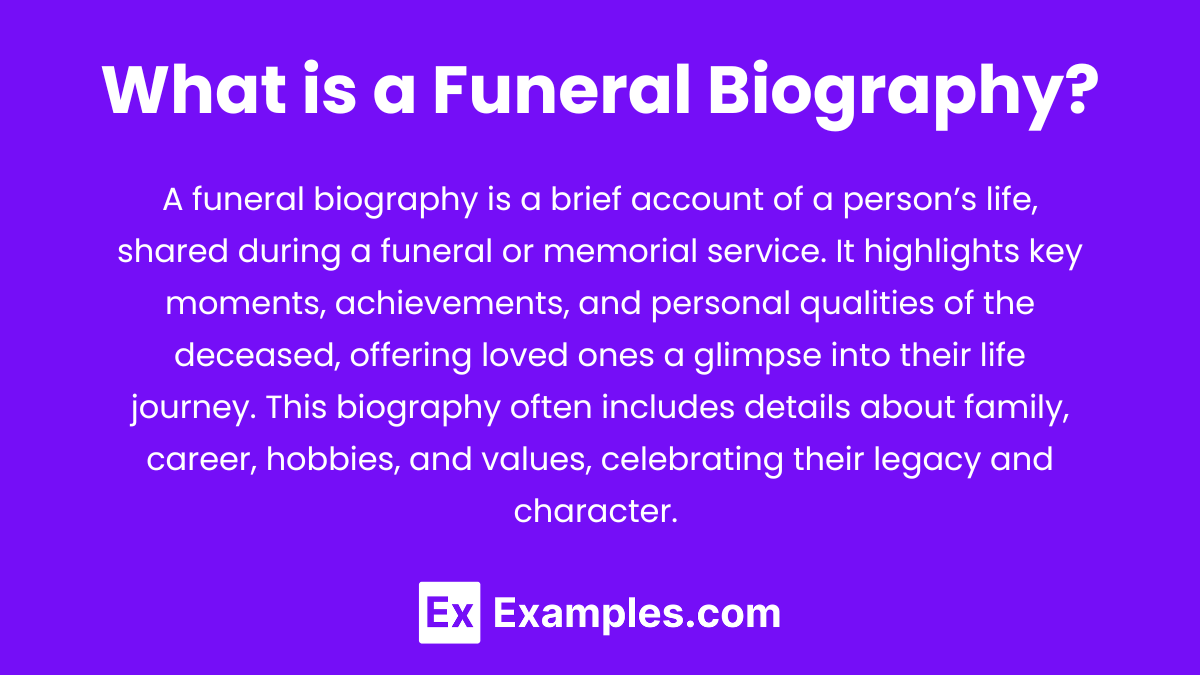
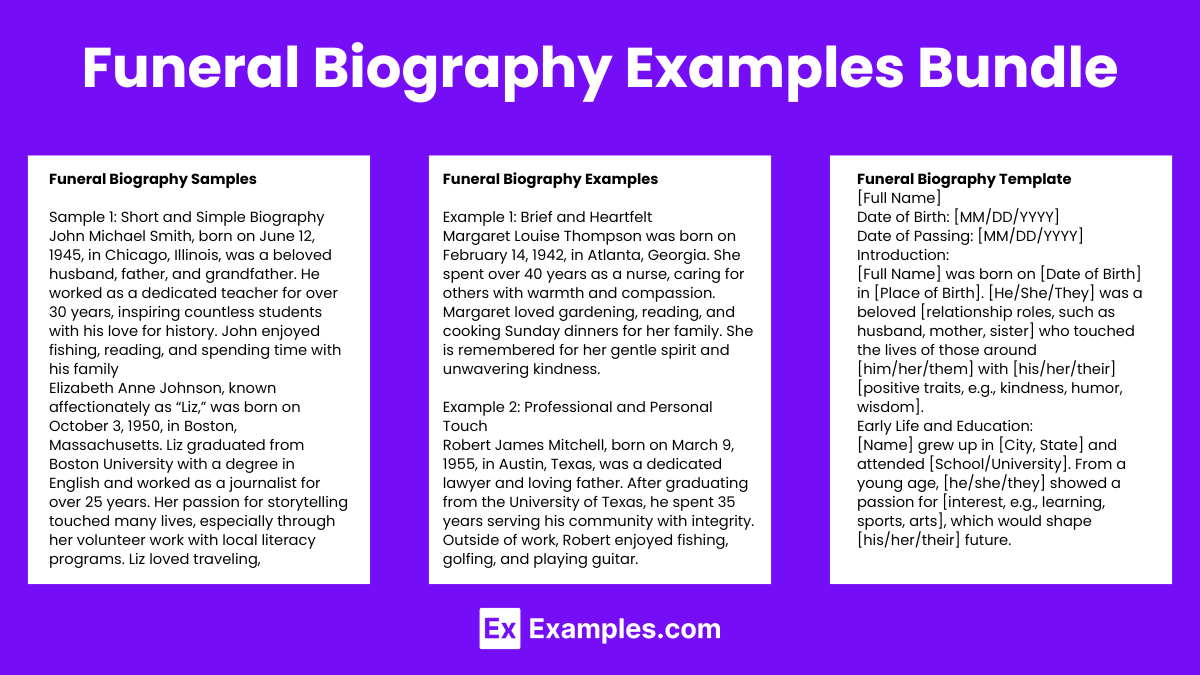
Download Funeral Biography Examples and Bundle
Key Elements of a Funeral Program Biography
Personal Information
Full Name (including nicknames)
Date and Place of Birth
Date and Place of Passing
Family Background
Names of parents, siblings, spouse, children, and other close relatives
Notable family relationships or bonds
Early Life and Education
Brief account of childhood and upbringing
Educational background, including schools attended, degrees, and any significant achievements
Career and Achievements
Overview of career path and key roles or positions
Professional accomplishments and awards
Personal Interests and Hobbies
Hobbies, passions, and interests that defined their character
Contributions to community activities, clubs, or organizations
Significant Life Events
Important milestones, such as weddings, anniversaries, or personal achievements
Notable travels or experiences that shaped their life
Values and Beliefs
The deceased’s principles, beliefs, or faith that guided their life
Reflections on their character traits and what they were most known for
Legacy and Memories
Impact on family, friends, and community
Any memorable quotes, stories, or messages that embody their spirit
Funeral Biography Samples
Sample 1: Short and Simple Biography
John Michael Smith, born on June 12, 1945, in Chicago, Illinois, was a beloved husband, father, and grandfather. He worked as a dedicated teacher for over 30 years, inspiring countless students with his love for history. John enjoyed fishing, reading, and spending time with his family. He will be remembered for his kindness, humor, and unwavering support for those around him. He is survived by his wife, Mary, his two children, Sarah and Michael, and four grandchildren.
Sample 2: Detailed Biography
Elizabeth Anne Johnson, known affectionately as “Liz,” was born on October 3, 1950, in Boston, Massachusetts. Liz graduated from Boston University with a degree in English and worked as a journalist for over 25 years. Her passion for storytelling touched many lives, especially through her volunteer work with local literacy programs. Liz loved traveling, baking, and knitting, and she treasured time spent with her family and friends. Her warmth and compassion left a lasting impact on everyone who knew her. Liz is survived by her husband, James, her son, Alex, and her sister, Margaret.
Sample 3: Reflective and Personal Biography
Michael Anthony Davis, born on January 15, 1960, in New York City, was a man of many talents and a heart full of generosity. He pursued a career in architecture, designing buildings that reflected his creative spirit and attention to detail. Michael was an avid painter and loved exploring art galleries in his free time. Known for his wisdom and kind nature, he was a mentor to many. Michael is survived by his loving wife, Laura, his daughter, Emily, and a community of friends who cherished him deeply.
Funeral Biography of a Mother
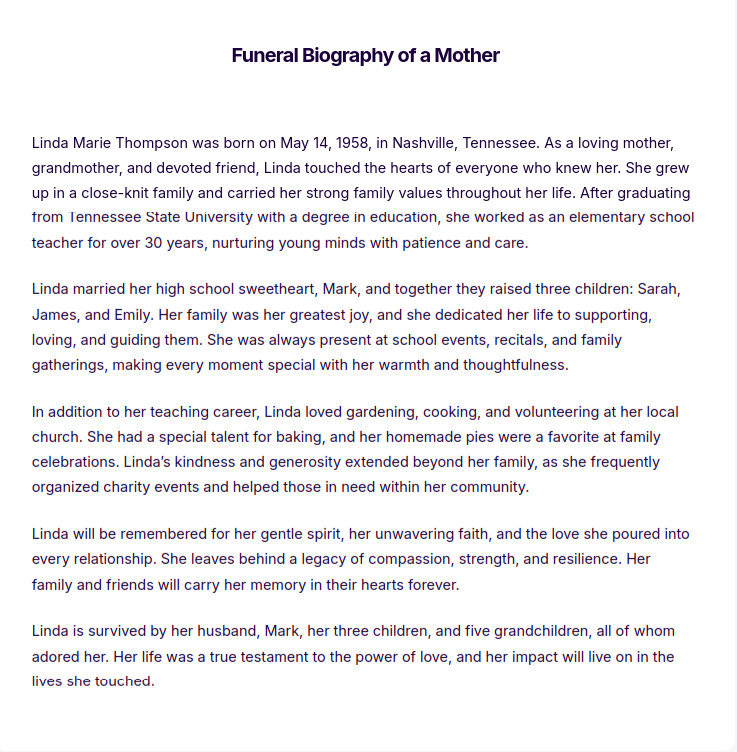
More Funeral Biography Examples and Samples
People always wonder what’s so good about goodbyes. There really is no acceptable answer for that. Saying our emotional farewells and letting go of the people we love is always tough. Goodbyes could mean we never get to be with our loved ones ever again. It also means we never get a second chance to say things we couldn’t vocalize. Hating the idea of never seeing someone ever again rides along with the fear of forgetting those that matter to us. That’s why, as we send them off to their final resting place, we must remember them, how they lived, and keep them in our hearts forever.
A biography is a written record of the life story and details of a person, whether alive or deceased. In a biography, the writer is either a family member, friend, or anyone who knows the person very well. This is different from an autobiography where a person writes about his own life story and experiences. So with this definition, a funeral biography is a record of the life of someone who has passed away. This is read or presented during the person’s funeral as a way of remembering him before the final goodbyes are said. This is also kept as memorabilia long after the deceased has been laid to rest.
Who was he?
Funeral biographies can come in two forms: obituaries and eulogies. Although both detail a person’s life, their weight differs greatly. Obituaries are written newspaper reports about a person’s passing. This shortly discusses the life of a person, how they died, and the location of his memorial. They serve as an announcement to reach all those who knew the departed. They aren’t always as personal as eulogies, but they still get the job done. Eulogies, on the other hand, are more extended, more personal, and written by someone who was close to the one pushing daisies. This is tearfully read in front of the person’s family and friends during the memorial service.
Shared below are steps on how to write a funeral biography. Tips that you need to remember in writing biographies are also included.
Biography Worksheet Template
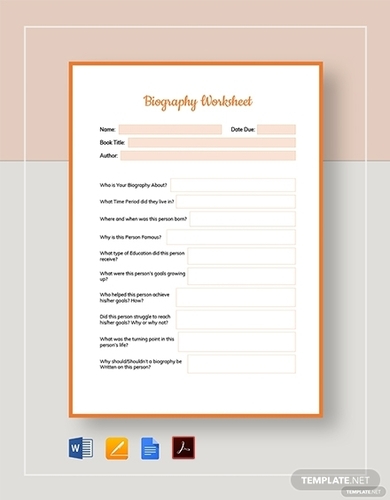
Understanding the Purpose of a Funeral Program Biography
A funeral program biography is a heartfelt tribute included in the funeral or memorial service program that encapsulates the life story of the deceased. Its primary purpose is to honor and commemorate the individual’s life, providing attendees with a meaningful glimpse into who they were beyond the memories shared by close family and friends.
Here are key reasons why a funeral program biography is important:
- Celebrating Life: It highlights the significant milestones, achievements, and cherished moments of the person’s life, celebrating their journey and the legacy they leave behind.
- Connecting with Attendees: Not everyone attending the service may have known the deceased intimately. The biography helps bridge that gap by sharing personal stories, values, and passions, allowing all present to connect on a deeper level.
- Preserving Memories: The biography serves as a tangible keepsake for family and friends. It immortalizes the individual’s story, ensuring their memory continues to live on in the hearts of those who read it.
- Providing Comfort: Reading about the full and meaningful life of the loved one can offer solace to grieving attendees. It reinforces the impact the person had on others and the world around them.
- Facilitating Reflection: It encourages attendees to reflect on their own lives and relationships, fostering a sense of community and shared humanity during a time of loss.
How to write a biography of a dead person
Writing a biography for a deceased person involves creating a respectful and heartfelt account of their life. Here’s a step-by-step guide to help you craft a meaningful tribute:
- Gather Basic Information
- Collect details like birth date, place, family background, and date of passing.
- Talk to Family and Friends
- Interview those close to the deceased for stories and memories.
- Outline Important Life Events
- List key moments like childhood, education, career, and major achievements.
- Describe Personality and Interests
- Include hobbies, values, beliefs, and what they were passionate about.
- Mention Accomplishments and Legacy
- Note their professional achievements and how they impacted others.
- Add Personal Stories or Quotes
- Share a few memorable anecdotes or favorite quotes.
- Finish with a Reflection
- Conclude with a positive message on how they’ll be remembered.
- Edit and Revise
- Review for clarity, accuracy, and respectfulness before finalizing.
FAQ’s
What is the purpose of a funeral biography?
A funeral biography honors the life of the deceased by highlighting key events, achievements, and personal qualities. It provides attendees with a meaningful overview of their life, allowing loved ones to reflect on their legacy.
What should be included in a funeral biography?
A funeral biography should include personal information, family background, education, career, interests, significant life events, values, and any memorable stories or quotes that capture the essence of the person’s life.
How long should a funeral biography be?
The length of a funeral biography varies, but it is typically around 200-500 words. It should be long enough to give a complete picture of the person’s life, but concise enough to be read aloud during a service.
Who usually writes the funeral biography?
A close family member or friend typically writes the funeral biography. In some cases, a funeral director or professional writer may help if family members prefer assistance.
Can we include quotes or stories in a funeral biography?
Yes, including quotes, anecdotes, or personal stories can make the biography more personal and memorable. These elements offer insights into the deceased’s personality and help celebrate their unique character.


